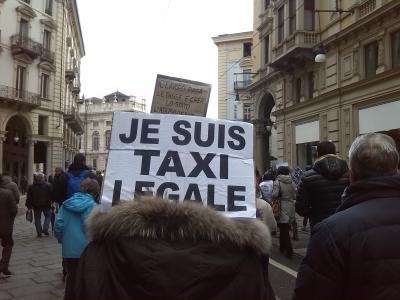Taxi drivers march against Uber

TURIN – More than one thousand taxi drivers took to the streets in protest against private app-based taxi companies. The protest involved drivers from all over Italy and moved from Piazza Arbarello to Piazza Castello where they protested outside the regional prefecture.
At the protest on Tuesday, taxi drivers called for for the legality of companies such as Uber to be clarified. Last week a landmark ruling by a judge in Genoa ruled in favour of an Uber driver and ordered that he be reinstated with his driving licence after it had been removed by the police.
In the afternoon the protesters, carrying placards bearing the slogan: “Je suis taxi legale” moved to Via Nizza near the city's Lingotto district. Protesters blocked the road in front of the national transport authority, pelted building with eggs and set off smoke bombs. Traffic was stooped for hours.
As Taxi drivers tried to protect their livelihoods the public mood towards their cause was largely ambivalent, if not hostile. Nick McMahran tweeted: “They dare to talk about legality but are always ready to rip off clients with unacceptable tariffs #uber forever!” While Andrea Giunchi tweeted: “Next we'll have Baristas striking outside the headquarters of Bialetti.”
Uber's response to the protest was to lower its fares in Italy by twenty percent.
Taxi drivers have staged protests against Uber in cities worldwide, but the latest show of solidarity comes after the controversial San Francisco based start-up extended its UberPop service to Italy.
UberPop allows registered drivers to use their cars to offer lifts to passengers via a mobile app. The price of each lift is calculated by the app and then automatically debited from the passengers credit card. At the end of each week all Uber drivers are paid by bank transfer for fares taken during the week. Uber take twenty percent of each fare as a support and marketing fee and taxi drivers must pay their own petrol costs.
Italian taxi drivers argue that it Uber and its drivers are in breach of regulation that governs taxis and Ncc's (private hire cars with drivers). But the laws are complex and predate apps such as Uber so are therefore open to interpretation.
For instance, laws state that Ncc's cannot operate taximeters. However, Uber argue that there fares are not calculated by a taximeter but by an algorithm that runs through their app. Law's also state that all Ncc's should return to garages or taxi ranks in between fares – something Uber's practice of pre-booked fares through the app would seem to discourage
UberPop is currently active in Milan, Turin and Genoa and handles over 1000 fares a week on average. Tomaso Rodriguez, Operations Manager for Uber Italia, said: “demand is enormous and every time we arrive in a city there is a surge in inscriptions.” Uber operates in 53 countries and over 200 cities worldwide and is worth an estimated 40 billion USD ( 25.5 billion GBP). The company includes Google, Jeff Bezos and Goldman Sachs among its financial backers.
Uber began life as a luxury chauffeur service that required its drivers to be in possession of a top of the range auto and pass tests to demonstrate knowledge of their city as well as exceptional manners and politeness. However, newer services such as UberPop have less stringent requirements for would-be drivers.
To work with UberPop drivers must have at least ten points remaining on their license and possess a four door car no more than ten years old that is in mint condition. As an Uber driver they must maintain a feedback score of above 4.6 in order to be allowed to continue offering rides to clients.
Irrespective of the legality and convenience, becoming an Uber driver does not pay. One journalist for La Stampa reported taking home a meager 38 Euros after working an 8 hour day comprising nine fares throughout Turin.
The service has already been banned in Holland, Thailand, Spain and the U.S state of Nevada.


